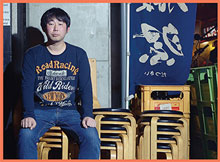Youth Voices
Finance & Development, March 2015, Vol. 52, No. 1
Irma Boracic-Suman, Ahmed Hassan, Takumi Sato, and Alexa Clay
In early 2012, F&D interviewed six young people from around the globe who were entering the workforce in an unfavorable economic environment.
We have revisited four of them—from Bosnia, Egypt, Japan, and the United States. We were unable to speak to Adilmer Garcia of Peru, who had moved from the mountains of northern Peru to a shantytown on the outskirts of Lima to pursue his work and gain an education. He lost his job at a glass cutters shop and in 2012 was seeking employment that would leave the morning or afternoon free for classes. Nor could we locate Chioma Nwasonye from southern Nigeria, who had been job hunting since her university graduation and had decided to attend graduate school in the meantime.
Here are the latest developments in the lives of the four young people we interviewed.
Finding a Dream Job in Bosnia

Irma Boracic-Suman graduated from the Sarajevo University Law School in 2009. It took four years and 385 job applications before she found her dream job in March 2013.
While Boracic-Suman, 28, is happy at her new job at the Sarajevo municipal court, she said she knows that many other young people remain jobless. At 45 percent, Bosnia and Herzegovina has the highest unemployment rate in Europe. According to the Bosnian Agency for Labor and Employment, the rate drops to 27.5 percent when workers in the informal economy are counted.
“When my colleague called and told me that I was nominated as a professional associate at the Sarajevo municipal court, I thought it wa
s a joke,” she said. A year before she got the job, Boracic-Suman passed her judicial exam with no jobs in sight.
“It was a period of filing new job applications, the period when one who has done everything needed to start a career after law school—passed the judiciary exam, gained the necessary experience—really becomes desperate and starts sinking into depression,” she said.
Boracic-Suman found most job ads on the Internet or on the websites of individual companies, submitting 90 percent of her applications by email. In most cases she never got a reply.
She said she believes that it took her so long to find a job because her family was not influential or politically connected. She said she is proud that she was chosen on her qualifications and skills. “My confidence in the legal system returned during the interview for this job, when interviewers asked me questions based on my knowledge, both theoretical and practical, about my views of certain legal solutions,” she said. “I am so glad that they recognized my ambition and efforts to gain the necessary knowledge.”
She works at the court division that deals with the execution of court orders on collection of outstanding bills by Sarajevo municipal companies. Because of budget constraints, she is the only professional associate in the office. “I work very hard but don’t complain. I am so happy to be able to do what I like and feel completely fulfilled.”
She thinks that the years of waiting for a job have helped her build patience and understanding, which helps her when she has to deal with people who cannot pay their bills. “I can get properly into a case because I understand what the social injustice and poverty mean in our society today, and perhaps present the case in a better way,” she said.
Next year, Boracic-Suman can apply to be a judge. She said she hopes her qualities and hard work will be recognized by a selection committee, but said she would not be disappointed if she is not selected on her first try.
Boracic-Suman was married in December 2014, and the couple lives in an apartment she recently bought. The 20-year mortgage consumes nearly half of her monthly salary of 1,200 Bosnian marks ($754). But she is optimistic. “We have our own apartment, secure jobs, and state salaries,” she said. She expects her salary to increase once she becomes a judge.
Although Boracic-Suman is happy in Bosnia and Herzegovina, she said she understands why some young people want to leave. “I talk to people in various professions, such as nurses or IT specialists, and it is defeating that they can’t find work in their fields. Even though they are vital to the country’s functioning and development, the state does not care to provide them with job opportunities,” she said.
Boracic-Suman said that labor laws are the main reason for the massive youth exodus. If pension funds were strengthened, older workers could retire and create openings for young people.
“Persistence is the only way to accomplish something, at least in this country. The people here are condemned to get what they want by themselves, to fight with their own qualities and in their own ways. In my case, it was recognized, and I can only recommend to everyone to be determined to push for their rights.” ■
Reporting: Daria Sito-Sucic; Photography: Dado Ruvic
An Oscar Nomination in Egypt

Ahmed Hassan never imagined that the video clips he worked so hard to film during the 18 days of the January 25, 2011, revolution in Egypt would change the course of his life the way they did. Hassan met an Egyptian-American filmmaker, Jehane Noujaim, and each carried video cameras to record the events of the revolution moment by moment.
They turned the clips into a full-length documentary, “The Square,” with Noujaim as director and Hassan as both the director of photography and a main character. The documentary tells the story of the revolution—from the downfall of autocrat Hosni Mubarak to the replacement of elected President Mohamed Morsi in 2013. “The Square” was nominated for an Oscar in 2014.
“The Square” did not win an Academy Award, but its international prominence (Netflix began to offer what had been an online film in January 2014) catapulted the middle-class young man to sudden stardom, even as the authorities tried to suppress the documentary in Egypt.
“The censorship authorities did not approve the showing of the film in cinemas, but it was leaked on YouTube, and counterfeit CDs were being sold in the streets,” said Hassan. “It’s true that we did not receive any money from the film, but it reached every home, and popular cafés were holding special sessions to show the film—and I would receive invitations to attend these sessions. I can’t describe how happy I was.”
In August 2014, Hassan won an Emmy award from the International Academy of Television Arts and Sciences in the United States for his work on “The Square,” the first Egyptian to do so.
But Hassan is a reluctant star and leader. “After the revolution, young people were trying to encourage me to speak on their behalf in the media, but I refused because I’m convinced that I am not qualified to play the role of a leader. Aside from my previous role in the private and government media in Egypt, I preferred to remain in the shadows. Everyone who appeared in the media became an expendable face, and I preferred to focus on my work. I bought photography and editing equipment and started developing my skills in the profession.”
Hassan said he does not have a long-term vision of his future. “I like to live one day at a time,” he said. He is currently an independent director and photographer and is working on filming and editing another documentary on the events of the revolution. He is also about to finish a film on political detainees. The female lead of this film is the activist Sanaa Abdel Fattah, one of his close friends, who was convicted for protesting and sentenced to three years in jail in late 2014.
Hassan said he has not lost hope that democratic change will come to Egypt, but he said that he is bothered by its slow pace and by the country’s repetition of the same political mistakes.
And he wants to stay in Egypt, although he hopes to live abroad for a brief period. “I never think about emigrating. Right now I’m looking for a teaching position for a year or two in England or the United States, and I hope my luck holds out. I think this will make a big difference in my professional career.”
Hassan said that new technology and social media have played a major role in his professional life. “Speed has been very helpful to me. I would cover events and clashes and then upload them to YouTube, which would get tens of thousands of views, and this was a big reason for my success and fame.”
His artistic success has also been financially rewarding: “My monthly income has increased manyfold, and I am now living in my own house in a central part of the city [Cairo].” He gave his old house to his mother and sisters and supports them.
Even so, he is not ready for marriage. “It’s true that my financial situation has improved . . . but I can’t afford to get married at the present time; maybe I will wait another couple of years.” ■
Reporting and photography: Hisham Allam
In Japan, One Step Forward, Two Steps Back

It has been a roller-coaster couple of years for Takumi Sato, who in that time has found a job, tried to cope with mental health issues, lost a job, and now considers himself a victim of the government’s economic policies.
And while Sato’s concerned parents have persuaded him to spend more time at their home, east of Tokyo, he is still fiercely independent and will not give up his one-room apartment in Kawagoe, a suburb north of Tokyo.
Sato, 26, said he is determined to get by on the roughly $1,000 he receives every month in government assistance. “I have to be quite careful, but I’m used to that now, and every month I try to make sure I have a little left over that I can save up,” he said.
Things had once been looking up for Sato. He had a six-month contract with a company that makes animated television shows and video programs, and even though it was not renewed, he quickly found another six-month stint with a firm that prepares bento box lunches for supermarkets and convenience stores. But then Sato—who had been diagnosed with Asperger’s syndrome (considered an autism spectrum disorder) and attention deficit hyperactivity disorder—was advised by a doctor to quit his job because his mental health had deteriorated.
After recuperating, Sato joined “Hello Work,” the Japanese government’s employment service center, and said he was delighted to find a new job almost immediately with a firm that creates smartphone and online games. “It was like a dream come true because it was exactly the sort of job that I wanted,” said the technical college graduate who studied computer game design and production.
Yet Sato was again on a six-month renewable contract, the same situation as millions of workers who had once enjoyed the job-for-life model with one of Japan’s companies. After the economic downturn that began in the early 1990s, that system withered.
“They said I would be able to get full employee status after I completed my first six months,” Sato said. “That meant that I didn’t get any of the benefits of the regular staff I was working alongside, and six months felt like a really long time.”
Stress began to take its toll; he was unable to sleep and often arrived for work late. The company warned him repeatedly that he needed to arrive on time, but that just made things worse, Sato said. Sato’s doctor diagnosed a sleep disorder, and although the company paid him until the end of the contract, it was not renewed.
He is now unemployed and undergoing treatment for his mental health problems. “I really want to work,” he said. “I want to find a place where I am accepted for who I am, where people understand my condition. That’s why I’m getting help from people who are showing me how I can be a productive member of the workforce.” Everything else, from making friends to having a family of his own, is on hold. “I can’t work, so how can I find a partner and provide a family with security?”
Sato seems resigned to his plight. Only when Japan’s political situation comes up does he become animated, even angry. “Abenomics has done absolutely nothing for me or millions of people like me,” he said, referring to Prime Minister Shinzo Abe’s efforts to strengthen the Japanese economy through fiscal stimulus, monetary easing, and structural reforms.
Sato said Abe’s policies have widened the gap between those in Japanese society who are wealthy and the have-nots. “He’s helping people who already have it all,” he said. “It’s the rich; it’s big companies and elderly people. People like me—the young, the part-time employees, the out-of-work, the sick—we have no voice and no rights anymore,” he said.
In November 2014 Abe called a snap parliamentary election for the following month.
Sato said he voted for the Japanese Communist party in the December election. Abe’s party won handily. ■
Reporting: Julian Ryall; Photography: Alfie Goodrich
A Round Peg in a Square Hole in the United States

Alexa Clay was feeling a little lost and confused. Part of that was culture shock: the social activist had recently returned for a brief visit to Washington, D.C., from Berlin—which she presently calls home. She said she was struck anew by the frantic pace and work-obsessed nature of life in the U.S. capital.
The other reason for her confusion was more existential. Clay spends much of her day pondering some of the great issues of our age: Whither capitalism? What is the fate of the last remaining superpower? How can meaningful change be instigated within huge, monolithic corporations?
When F&D spoke to Clay two years ago, she was working for a nongovernmental organization and was deeply involved with the Occupy movement, a series of protests that grew out of the financial crisis of 2008–09. The movement was fueled by disgust at what it considered the avariciousness of Wall Street and appeared poised to persist. Instead, Occupy lost steam and essentially has disappeared from public consciousness.
Two years later, Clay admitted to being less hopeful about the possibility of social change. “Things are just much more complicated and complex [than I used to think]. I would say I’m working just as hard on the same things, but yes, change is not coming as quickly as I would have liked.”
Post-Occupy, Clay remodeled herself into a self-described “cultural hacker” and revels in her outsider status. Her website describes her as “chief misfit” with the aim of “rewiring the spirit of capitalism one misfit at a time.”
Misfit may be clear, but “cultural hacker”? “Both my parents are anthropologists, so culture has always been really important to me. Culture isn’t static and we can actively shape culture.” She said she works with people to empower them to take action to change culture. And hacking “is about knowing systems so you can transform them. Hackers really know how to break apart systems. They know every element of the system. There is an urgency to it. There is this sense that your allegiance is for some greater good.”
As part of her cultural hacking agenda, Clay helped found the “League of Intrapreneurs,” which provides peer support to employees of large organizations (or as she calls them, “cubicle warriors”) who want to transform their businesses from within.
She gave as an example a third-generation auto industry employee she identified as Dave. His aim is to get the company he works for to rethink urban transportation beyond its primary objective of manufacturing cars.
“With someone like Dave, the first thing we would do is an hour-long interview where we really feel out his identity as a social intrapreneur: he’s a member of Amnesty International; he’s a Catholic. He brings all these other elements into his job. A lot of other people may not have the same courage to be that authentic within the workplace.”
“After we spoke to him, we did a first convening, where we brought together 20 people that we felt met this description. We had them all meet each other. Then we ran a global competition to source even more people into the network.”
Clay’s work involves much talk, but conversation, networking, discussion, and the exchange of ideas are, for her, an end in themselves. The cultural hacker writes on her website, “I use conversation as a tool for understanding the state of the world. I use conversation to find connection. I use conversation for play.”
But a woman cannot live on conversation alone, and Clay’s nomadic existence over the past two years has been financed by such activities as public speaking, consulting, and writing.
In line with her celebration of society’s oddballs, Clay has coauthored a book, due out later this year, The Misfit Economy, which looks at innovators in the underground and informal economy—the “misfits” of the title.
Clay’s examples of misfits include the unsavory—Somali pirates and drug dealers—and Lady Gaga, whom she calls an example of a round peg in a square hole who capitalizes on “misfit sentiment.” That may be as apt a description of Clay as it is of Lady Gaga. ■
Reporting: Hyun-Sung Khang; Photography: Michael Spilotro


